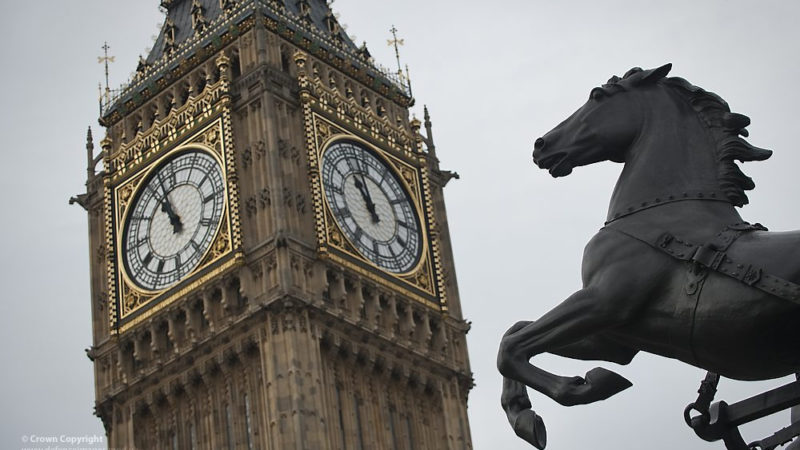British politics take up more newspaper space than ever before. But Westminster is now all talk and little action, writes Lib Dem peer Lord Wallace.

Viewed either from outside or inside Westminster, British politics is becoming surreal.
The UK is drifting towards a deadline for leaving the European Union, nine months from now. A deadline for which the Government still has no strategy, and for which it’s already too late to get the required adjustments in place.
Both Labour and Conservatives are deeply split – and not just over Brexit.
Hysterical attacks from right-wing media, above all the Daily Mail, label a widening circle of otherwise respectable people ‘traitors’ and villains.
Meanwhile, most of our population seem disengaged from politics; the opinion polls have hardly moved over the past year.
So far, our divided government has avoided hard choices by putting off decisions, time and time again. The EU Withdrawal Bill should have become law by now; there are several more important bills to implement Brexit behind it, and several hundred statutory instruments to replace EU agencies and regulations with British equivalents – many more than Parliament will be able to handle by March 2019.
But the European Council at the end of June is looming, for which our Prime Minister will be expected by her continental colleagues to have some clear and detailed (and workable) proposals.
So the idea of a longer transition period after the UK formally leaves, of three years or more, is floating around Whitehall:
Brexit, it turns out, may not mean Brexit until 2022 or later.
The Mail’s role in the current British political debate is comparable to that of Fox News in the American. It presents to its readers an alternative reality.
When the Times reports that the Eurozone is recovering, and that Britain’s economy is flatlining, the Mail reports that continental economies are suffering and that Britain has record employment. Several months after other papers had reported on Best for Britain’s plans, the Mail has ‘revealed’ a ‘conspiracy’ to reverse Brexit, funded largely by ‘foreign billionaires’ – with large pictures of George Soros provided, two days running.
Attacks on the personal integrity of those who differ from the Mail proliferate, with lines of photos of the guilty men: the Duke of Wellington among them one day (for supporting an amendment to the EU Bill), the heads of industrial organisations another.
Repeated attacks on the BBC serve to support the Mail’s claim to be telling their readers what the liberal elite don’t want them to know.
Jacob Rees-Mogg epitomises this air of magical unreality.
He presented himself, in the wake of government defeats in the Lords on the EU Withdrawal Bill, as on the side of the people against the peers, going on to accuse the Lords (on the Leveson Enquiry into the press) of seeking to protect ‘the vested interests of the very rich’. He then bought an additional house in Westminster for his expanding (and privately educated) family, for over £5 million.
Boris Johnson seems to share this mystical status as media darling and constant critic of his own government, writing articles in the Telegraph as if he were a journalist rather than a minister. All the while calling for his own aircraft to carry him in greater comfort round the world.
Meanwhile, both domestic and foreign investment in the UK has dropped, and multinational companies are quietly moving staff to the Netherlands, Germany, France and Ireland.
And domestic issues are suffering from neglect: the new apprenticeship scheme is failing, school budgets are squeezed further, police numbers have continued to shrink.
As Philip Hammond, alone among government ministers, has noted: the failures of outsourcing, rising inequality in executive pay, and the deliberate blindness of accountancy firms are stirring unease at the rules of our economic system which no government should ignore.
This cannot last. If the Government avoids a confrontation at the June European Council, over the Irish border, its demands for access to EU programmes after we have left, or its simple inability to define what it means by ‘a deep and special partnership’, the October European Council will be its last chance to negotiate an acceptable deal.
Before then, the Government will have to carry the amended EU Bill through the Commons – and the Labour front bench cannot then avoid defining its position on the customs union and the single market.
If agreements are not reached, the pound will probably drop further, and the economy will dip again.
The Brexiteer right is waiting to blame the EU for any breakdown, whipping up nationalism to cover their own inability to put forward any workable alternative to continuing membership. Political and media rhetoric would become more embittered, and more irrational.
All those who care about reasoned democratic politics, and social justice, and international cooperation, will have their work cut out to resist such an illiberal tide.
Lord Wallace of Saltaire is a Liberal Democrat peer.
To reach hundreds of thousands of new readers we need to grow our donor base substantially.
That's why in 2024, we are seeking to generate 150 additional regular donors to support Left Foot Forward's work.
We still need another 117 people to donate to hit the target. You can help. Donate today.



